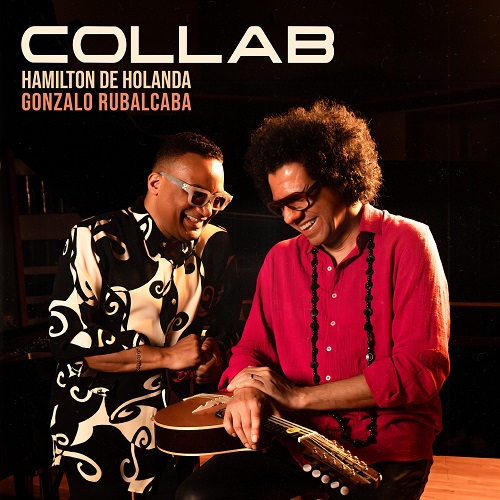Gonzalo Rubalcaba and Hamilton de Holanda – Collab

G
Sony Music Brasil
Duets between mandolin and piano date back to Beethoven but are quite rare in the jazz world. Chris Thile's 2017 album with Brad Meldau is a superb example and this new release is something special too.
This album combines renowned Afro-Cuban pianist Gonzalo Rubalcaba and virtuoso Brazilian mandolinist Hamilton de Holanda, who compose three tracks each, alongside four dramatic arrangements of existing compositions. The soundworld here is very different to Thile and Meldau - less vocal based and more contrapuntal. In many ways it's similar to the brilliant piano/banjo duet album "The Enchantment" by Chick Corea and Bela Fleck.
The virtuosity is so striking that it takes a few listens to see past that and notice the quality of musical invention. The sonorities and timbral effects are amazing too. An intimate and detailed recording - not too much reverb - allows the sounds of the two instruments to combine in surprising ways. At times it's like listening to a prepared piano. Hamilton is known for his capacity to extract a wide range of sounds from his 10-string mandolin, offering a fuller range than the standard 8 string instrument.
This is music saturated with the vibrant colors and harmonies of Brazil, ranging from traditional choro to samba and bossa nova, and combined with driving Afro-Cuban rhythms. The free flowing improvisation is deeply rooted in jazz, the piano recalling both Herbie Hancock and Oscar Peterson at their best. The mandolin sometimes sounds like a very modern Django Reinhardt, both in the expressive melodic lines and the incisive rhythm work.
The first three tracks are fast music with infectious rhythms and surprise syncopations to the fore. Then "Yolanda Anas" slows things down for some truly "singing" mandolin lines.
"Flying chicken" is frighteningly energetic; the fast cross-rythms often sound like Conlon Nancarrow's "Studies for player piano" which are notorious for being unplayable. The synchronised sense of time from both musicians is almost uncanny.
"Don't you worry 'bout a thing" features harmonica from guest Gabriel Grossi alongside one the more inventive Stevie Wonder covers I've heard.
The Charlie Haden tune "Silence" is given haunting exploratory chording reminiscent of Louis Bonfa. "Choro Fado" also has a Latin flavour, this time recalling Villa Lobos' film music - and with a hint of Spaghetti Western exoticism!
Brazilian song “Incompatibilidade de Gênios” by João Bosco and Aldir Blanc is presented in two versions—one instrumental and one sung nicely by João Bosco himself.
The music is sometimes abstract and complex but the enthusiasm and warmth of both musicians make it an inspiring listen. An album to treasure!
© Stephen Godsall













